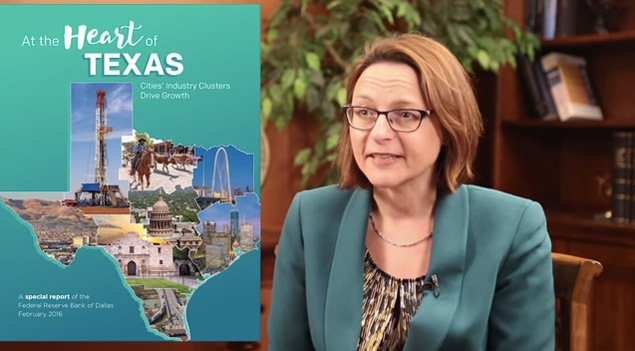[d-embed][/d-embed]
To be more precise about it, in a report issued today about the industries of Texas’ major cities, the Federal Reserve Bank of Dallas says the economy of the Dallas-Plano-Irving metropolitan area (this includes Dallas, Collin, Denton, Rockwall, Ellis, Kaufman, and Hunt counties) will do better in terms of employment than the rest of the state this year:
Although the Dallas area is not immune to the impact of low oil prices, it will likely achieve net job gains in 2016 and outperform the state average. One factor is that only 6 percent of the metro area’s workers are employed in the mining and energy cluster. Additionally, the U.S. economy is doing well, and thousands of jobs are coming to the Dallas area as companies such as State Farm, Toyota and Liberty Mutual consolidate operations. Despite a few challenges, the area will continue to realize good growth in the medium term.
Just like Mayor Rawlings has assured us. By contrast, the Fed has some concerns about the Fort Worth-Arlington side of North Texas (Tarrant, Wise, Parker, Johnson, Hood, and Somervell counties) because of its dependence on government spending:
Federal budget constraints could, over the long term, limit the outlook for the historically powerful defense and security cluster and the 4 percent of the workforce it represents. Continuing price weakness in energy, which makes up 7.7 percent of the region’s employment and is classified as a star among Fort Worth’s clusters, will damp prospects and limit natural gas exploration along the Barnett Shale. Conversely, relatively low fuel prices will support demand for air travel and autos, such as the large SUVs that GM’s Arlington plant builds.
But both are maybe better off than Harris County and its environs:
Houston’s economic diversification from its energy base won’t allow it to escape pain from the oil price collapse, while Dallas’s large and growing business and financial services sector should lead to continued growth as the state economy slows.
And poor Midland-Odessa. It’s bad enough those people have to live in the middle of nowhere, but this too?
The oil price collapse poses a major challenge for Midland–Odessa’s economy, with the energy industry accounting for a third of the area’s employment and nearly half of total wages earned in 2014. Overall employment has already begun to decline, and a new push in the energy industry to cut costs may diminish wage growth. The shale boom drove up demand for housing and commercial development; the bust will impact construction and real estate along with manufacturing and transportation.





